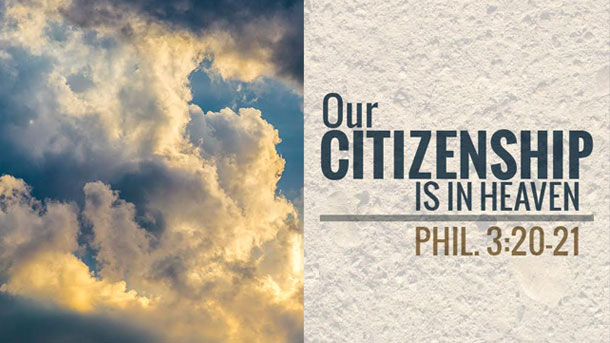- What does it mean to be a citizen of Heaven?
- Freedom in Christ in a Carnal Kingdom.
- The Holy Spirit in a Carnal Kingdom.
- Groaning in a Carnal Kingdom.
- The Seal of the Holy Spirit of Promise in a Carnal Kingdom.
*The following sermon was taught at a KJV-only church, hence the required explanation of the word “conversation”.
Introduction
After 70 years of captivity in Babylon, the book of Ezra tells us that Judah was allowed to return to her homeland in a divine appointment set by God. Babylon (part of the Persian empire at this point) was a place far removed from Jerusalem and the temple, accommodating of foreign gods and a culture that was generally in opposition to the life of holiness associated with being a Jew[1]. The Jews were God’s chosen people whom he had called out of Egypt with great signs and wonders, a people with whom God had initiated multiple covenants—one being the promise that through them all nations of the world would be blessed. Furthermore, God gave them the privilege of stewarding his laws and ordinances, a copy on earth of the things in heaven. Being of the nation was inseparable from practicing the religion. Judah and Israel were the closest things to the Kingdom of God on earth, the temple being a resting place for the presence of the LORD God himself.
God, being faithful and merciful, once again calls his people home with a strong hand. As predicted by the prophet Isaiah (Isa 44:28), Cyrus, the King of Persia, not only allows for the Jews to leave captivity and return home, but calls on the people to give them resources to aid them in their journey. He also returns all the plundered goods from the temple. Judah can now rebuild the temple, implement the sacrificial system, observe the feasts, and restore themselves to the nation that God created them to be.
Yet the Bible records that only 48,000 were moved to make the initial trip, a very small number compared to how many had been taken captive. Most had been born among the modern wonders and comforts of Babylon, and the tales of a temple, an alter, sacrifices and a monotheistic invisible God had become just that, tales. Some had probably become financially successful and/or had achieved a good status and did not want to give that up for a pipe dream. What could have infused this mindset into God’s chosen people, the nation brought out of Egypt with signs and wonders to bear the name of the only true God?
“The result was that many of the Jews had become so comfortable and prosperous that, when the call came for them to return and undertake a journey of some 900 miles to a city in ruins and a temple that no longer existed, they simply could not rise to it. The cost was too great and the shock to their system too disturbing. Dare we criticize them for that? And yet we cannot overlook the fact that they were refusing to live up to their destiny as God’s chosen people.”[2]
The most direct conclusion is that due to their immediate surroundings, many of God’s chose people had grown comfortable practicing a form of religion in a kingdom other than their own. Even though their identity and purpose were attached to the alter, sacrificial system, the temple, and even though God’s hand was clearly with them, the transition from the secular kingdom to the Kingdom of God was just too much. They had forgotten that their true citizenship was of God’s kingdom, not Babylon’s.
As followers of Christ, we also experience being of a kingdom but sometimes feeling far removed from that kingdom. Paul wrote to the Philippians and made the both comforting and challenging statement that their citizenship is in heaven.
What does it mean to be a Citizen of Heaven?
[Phl 3:18-21 KJV] [18] (For many walk, of whom I have told you often, and now tell you even weeping, [that they are] the enemies of the cross of Christ: [19] Whose end [is] destruction, whose God [is their] belly, and [whose] glory [is] in their shame, who mind earthly things.)
Paul contrasts those who walk as pressing towards the mark of the high calling (those apprehended by Christ – vs 12) with those who walk according to their own desires and carnal appetites (belly). The things they glory in are really the things they should be ashamed of before God. They are only thinking about life here on earth, hence everything they reap is really corruption (Gal 6:8).
[20] For our conversation is in heaven; from whence also we look for the Saviour, the Lord Jesus Christ: [21] Who shall change our vile body, that it may be fashioned like unto his glorious body, according to the working whereby he is able even to subdue all things unto himself.
In the KJV, this Greek word is used only once, translated to English as “conversation” over 400 years ago. Since the meanings of words change and evolve over time, the archaic use of conversation in the KJV does not mean what it meant at the time of the translation[3]. The clear meaning of word is “citizenship” or “place of citizenship”.
????????? politeuma; from 4176; a form of government, citizenship:—citizenship(1).[4]
4487 ????????? (politeuma), ???? (atos), ?? (to): n.neu.; ? Str 4175; TDNT 6.516—LN 11.71 place of citizenship (Php 3:20+)[5]
“The word ?????????, “citizenship,” found only here in the nt, is more accurately translated “commonwealth” or “state” (see Stauffer, New Testament Theology, 296–97). Often ????????? was used to designate a colony of foreigners or relocated veterans (BDAG) whose purpose was to secure the conquered country for the conquering country by spreading abroad that country’s way of doing things, its customs, its culture, and its laws.”[6]
For our citizenship is in heaven. Our residence, our community, our form of government, which includes our rights, privileges and responsibilities, are all in heaven. This contrasts those who mind the earthly things (vs 19). We mind the heavenly things. We mind these things not just because we desire to go there, but because we are already citizens of the Kingdom of God. In other words, although we have not yet fully been there, our desires and natural aspiration are now both from and towards the Kingdom of Heaven.
Note that Paul speaks of our citizenship in the present. We are citizens. This has been touched on in past teachings, but a good way to think of the Kingdom of God is “now, but not yet”. Meaning, Jesus proclaimed the arrival of the kingdom (he is the king) and we have access to kingdom powers and principles here on earth, yet the full fruition of the kingdom of God is yet to come.
God does not intend for us to merely run the race with a hope of obtaining a heavenly kingdom. God’s promises inform us that we should run the race from the position of already being kingdom citizens.
We don’t only fight to obtain victory; we fight from a position of victory.
We don’t only walk to obtain blessings, but are already blessed (blessed, happy, fortunate[7]) as the beatitudes state (Matt 5:3-12).’
We don’t just endure to the end in order to be saved; because we are saved we endure to the end.
Realizing that we are citizens of heaven gives us the liberty to:
- Be free in Christ in a Carnal Kingdom.
- Rely on the Holy Spirit in a Carnal Kingdom.
- Groan in a Carnal Kingdom.
- Be encouraged by The Seal of the Holy Spirit of Promise in a Carnal Kingdom.
Freedom in Christ in a Carnal Kingdom
As citizens there is neither Jew nor Greek (a), male nor female (b), slave nor free (c) (Gal 3:28).
- The wall of partition was broken down (Eph 2:14) in Christ. And while salvation is still from the Jews, everyone can be a child of Abraham by faith (Gal 3:7) and a child of God by faith (Rom 10:12). A circumcised Jew and an uncircumcised Gentile are both sinners, and both must go through he same process of justification and salvation.
- Under the law women could not carry the physical sign of the covenant, circumcision. Baptism is now applied to the heart of both sexes (Col 2:11-12). Women could not be priests. Under the new covenant, male and female are all priests (Rev 1:6), called to offer up spiritual sacrifices to God through Jesus Christ (1 Peter 2:5). Jesus reminded the Sadducees that in the resurrection there is not even marriage (Luke 20:35).
- One’s current condition, whether slave, servant or free, have no bearing on their current state of spiritual freedom granted by Christ, therefore one is free to submit to authorities because they answer only to God’s authority. [1Co 7:21-23 KJV] [21] Art thou called [being] a servant? care not for it: but if thou mayest be made free, use [it] rather. [22] For he that is called in the Lord, [being] a servant, is the Lord’s freeman: likewise also he that is called, [being] free, is Christ’s servant. [23] Ye are bought with a price; be not ye the servants of men.
The Holy Spirit in a Carnal Kingdom
One cannot be a citizen of Heaven without being made into a new creature by the Holy Spirit.
[Eph 2:18-22 KJV] [18] For through him [Jesus Christ vs 13] we both have access by one Spirit unto the Father. [19] Now therefore ye are no more strangers and foreigners, but fellowcitizens with the saints, and of the household of God; [20] And are built upon the foundation of the apostles and prophets, Jesus Christ himself being the chief corner [stone]; [21] In whom all the building fitly framed together groweth unto an holy temple in the Lord: [22] In whom ye also are builded together for an habitation of God through the Spirit.
[18] Jesus, the Spirit and the Father unite us in family and community. Those who have the same father are connected whether they like it or not. Our access to our heavenly Father and all his kingdom benefits and authority is by the Holy Spirit, which came by Jesus Christ. Regardless of a human beings nationality, ethnicity, gender or financial status, they are united by and made citizens of heaven by the Holy Spirit.
[19] It is not in carnal gathering that we are of the household of God. It is in adoption into bodily relation with God. God is our Father. We are the body of Christ, and all members one of another—sisters, brothers, fathers and mothers.
[20-22] As citizens we are a temple in the Lord, a habitation of God through the Spirit. God is dwelling in us through the Holy Spirit. We have a bit of heaven in us that we carry around.
It is through the cross we have been justified and declared free from condemnation. It is by the Holy Spirit that we are citizens today. We see then the futility of living and striving outside of the will and power of God as revealed by through the Holy Spirit and God’s word. It is difficult to do sometimes because when we open our eyes we do not see the kingdom of God, we do not see the Holy Spirit, there is a tendency to feel removed from our kingdom.
The church in Philippi was likely experiencing the same thing. Paul’s use of the word citizenship is something the Philippian church would have understood for two reasons.
- Philippi was Macedonian city that was far away from Rome. Rome had conquered Macedonia, but the city of Philippi had been designated a Roman Colony. It had been warded “Italian Law”, “the highest legal privilege obtainable by any provincial municipality.”[8] The Roman citizens who dwelt there had access to the privileges and rights of Rome even though they were far removed. They were also under the law of Rome. Their physical location did not change their Roman status.
- Paul’s exhortation could have been twofold, one of encouragement that what they see is not reality, the other to not become complacent with the earthly privileges that they had been granted. Complacency can be the biggest enemies of Christians who are well off in the world. The Holy Spirit is called the “comforter” or advocate, meaning to come along side to help. Those who are already comfortable would need little of this Holy Spirit—the Holy Spirit being what makes us new creatures, or “heavenly citizens”.
- At the time of this writing, Rome was generally quite accommodating to the Jewish Religion and those who still practiced temple and synagogue worship. They were allowed self-government to a point, even given their own King (kind of) (Matt 2:1). Those Jews who chose Jesus as their Messiah were generally considered outcasts from the recognized Jewish religion and in turn cut off from the privileges associated with it (Acts 6:1). Scripture does not give us any evidence of the Roman government accommodating or supporting the organized gatherings and government of these Jesus followers (people of “the Way”(Acts 9:2, 19:9, 23; 22:4; 24:14, 22), disciples, Christians). And it did not help that many Jews called their faith heresy (Acts 24:14).
So whether Romans citizens or not, the Jesus followers of Philippi knew what it meant to be physically out of place. Paul’s proclamation that “our” (including himself) citizenship is in heaven would be quite comforting. Paul
“pictures the world as an empire over which Christ rules de jure, though not yet de facto. Each local church is a colony of heaven, its members enjoying full citizenship of the heavenly city (cf. Gal 4:26; Eph 2:19), but charged with the responsibility of bringing the world to acknowledge the sovereignty of Christ. Neither the Roman colonist nor the Christian depended for the meaning, character and purpose of his life on the ethos of his alien environment, nor did he allow that environment to determine the quality of his behavior.”[9]
Groaning in Carnal Kingdom
Paul is an honest believer. Paul is never afraid to tell others of the suffering they may suffer as disciples of Jesus, and he uses the final resurrection as a means of hope and encouragement to endure suffering. Paul actually just got done telling the Philippians that he longed to depart and be with Jesus (Phil. 1:23). Yes we have a mission today. Yes we need to be focused on the now. But a future heavenly kingdom and resurrection is something that needs to be an emphasis as it is our source of hope, and if ours, how much more those who are still lost? It’s OK to long after a heavenly kingdom. It’s OK to close your eyes and imagine a resurrected body with no pain and no illnesses.
[Rom 8:22-23 KJV] [22] For we know that the whole creation groaneth and travaileth in pain together until now. [23] And not only [they], but ourselves also, which have the firstfruits of the Spirit, even we ourselves groan within ourselves, waiting for the adoption, [to wit], the redemption of our body.
The self-help, self-prosperity lie is that because we are Christians we should feel fully complete in body, soul and mind while we win in life. Scripture would indicate that it is because we have the Holy Spirit that we also now have “the sighing of the soul for deliverance from the material world and from the prison of the body…”[10] The Spirit is the “first fruits” (a small portion of the final harvest) “of our full redemption, moulding the heart to a heavenly frame and attempering it to its future element.”[11]
Paul goes on to say that ”Likewise the Spirit also helpeth our infirmities: for we know not what we should pray for as we ought: but the Spirit itself maketh intercession for us with groanings which cannot be uttered“ (vs. 26). Don’t shy away from the groaning, from the longings. Pour them out before God, it is the Holy Spirit himself interceding for us “according to the will of God” (vs. 27).
To briefly sum up this section, God knows that we are away from our home. The Spirit in us longs to be in our natural home, hence it is expected that our current state will often feel unnatural, frustrating and insufficient and we will long for something better. Don’t let this longing be a stumbling block or “think it strange…”(1 Peter 4:12), rather use the groaning to pray to and connect with our heavenly father. Read all of Romans 8 for a better understanding.
The Holy Spirit as a Seal of Promise in a Carnal Kingdom
We have received the first fruits of that kingdom. One of the reasons is so we don’t have to navigate life in the carnal kingdom alone.
Jesus is the “first born” of the dead (Col 1:18) and the “first fruits” of those who sleep (1 Cor 15:20). He is the first of the new resurrection that believers will one day partake in. Scripture says that we have received the first fruits of the Spirit (Rom 8:23). This is a “down-payment” in the form of the Holy Spirit.
[Eph 1:13-14 KJV] [13] In whom ye also [trusted], after that ye heard the word of truth, the gospel of your salvation: in whom also after that ye believed, ye were sealed with that holy Spirit of promise, [14] Which is the earnest of our inheritance until the redemption of the purchased possession, unto the praise of his glory.
KJV uses the word “earnest”, which is basically a pledge or down payment. This word is used three times in scripture, each time referring to the sealing of the Holy Spirit in believers’ lives (Eph 1:14, 2 Cor 1:22, 2 Cor 5:5 ).
“originally, “earnest-money” deposited by the purchaser and forfeited if the purchase was not completed, was probably a Phoenician word, introduced into Greece. In general usage it came to denote “a pledge” or “earnest” of any sort; in the NT it is used only of that which is assured by God to believers; it is said of the Holy Spirit as the Divine “pledge” of all their future blessedness, 2Cr 1:22; 5:5; in Eph 1:14, particularly of their eternal inheritance. In the Sept., Gen 38:17, 18, 20. In modern Greek arrabona is an “engagement ring.””[12]
Paul mentions this again, almost word for word. We would do well to take note of that. God has sealed us, and given us the Spirit as a down payment or guarantee.
[2Co 1:21-22 KJV] [21] Now he which stablisheth us with you in Christ, and hath anointed us, [is] God; [22] Who hath also sealed us, and given the earnest of the Spirit in our hearts.
——–
Conclusion and Summary
Some of Israel didn’t even want to make the trip from the Promised Land from Babylon because they had grown comfortable practicing a form of religion in a kingdom other than their own. Somehow their surroundings had led some to not fully accept who they were as God’s chosen people.
Today our citizenship is in heaven. To accept anything less would frustrate the Holy Spirit within us, and it would be similar to having an identity crisis. Our strength and sustenance is from the heavenly, and our hopes and purpose is towards the heavenly.
True believers morn over the current sinful state of the world, they feel the vanity of this life. Those who are dying don’t look like they are winning. Those who suffer persecution with Christ may not always make it to church on time, dress the best, or appear “favored” in every aspect of our culture we may have been told we need to excel in “better than the world”. It is in the midst of this frustration that we must realize that it is all a natural byproduct of being out of our natural environment, from being away from our heavenly home.
As we run the race, we need to remember that our current citizenship is in heaven, and we know this because our citizenship has been sealed by the promise of the Holy Spirit and all the rights and privileges that go along with that. Therefore we walk according the principles and authority of heaven by the power of the first fruits of the Holy Spirit we all have received, looking forward to when we are transformed into our final bodies and we reside in the final Kingdom with our King.
[1]. Even in the N.T. book of Revelation Babylon represented a kingdom opposed to God’s new Jerusalem. “The literal Babylon was the beginner and supporter of tyranny and idolatry … This city and its whole empire were taken by the Persians under Cyrus; the Persians were subdued by the Macedonians, and the Macedonians by the Romans; so that Rome succeeded to the power of old Babylon. And it was her method to adopt the worship of the false deities she had conquered; so that by her own act she became the heiress and successor of all the Babylonian idolatry, and of all that was introduced into it by the immediate successors of Babylon, and consequently of all the idolatry of the earth.” Rome, or “mystical Babylon,” is “that great city which reigneth over the kings of the earth” (Rev. 17:18). M. G. Easton, Easton’s Bible Dictionary (New York: Harper & Brothers, 1893).
[2]. Peter Williams, Opening up Ezra, Opening Up Commentary (Leominster: Day One Publications, 2006), 30–31.
[3]. For a list of over Five Hundred archaic and obsolete words and phrases in the King James Bible along with their modern meaning and scriptural references, consult: David G. Burke Translation That Openeth the Window Reflections on the History and Legacy of the King James Bible (Atlanta: Society of Biblical Literature, 2009) 243-258.
[4]. Robert L. Thomas, New American Standard Hebrew-Aramaic and Greek Dictionaries : Updated Edition (Anaheim: Foundation Publications, Inc., 1998).
[5]. James Swanson, Dictionary of Biblical Languages with Semantic Domains: Greek (New Testament) (Oak Harbor: Logos Research Systems, Inc., 1997).
[6]. Gerald F. Hawthorne, Philippians, vol. 43, Word Biblical Commentary (Dallas: Word, Incorporated, 2004), 231.
[7]. Swanson
[8]. Hawthorne, 231.
[9]. Hawthorne, 231.
[10]. James D. G. Dunn, Romans 1–8, vol. 38A, Word Biblical Commentary (Dallas: Word, Incorporated, 1998), 474.
[11]. Robert Jamieson, A. R. Fausset, and David Brown, Commentary Critical and Explanatory on the Whole Bible, vol. 2 (Oak Harbor, WA: Logos Research Systems, Inc., 1997), 241.
[12]. Vine’s Expository Dictionary of Old and New Testament Words



